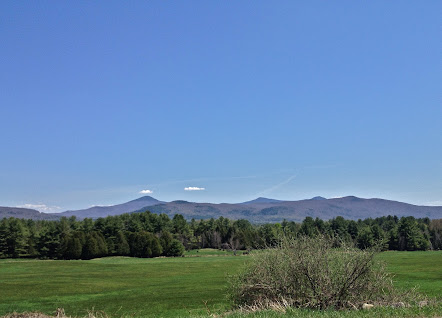April 24.
Sail to Ball's Hill.
The water is at its height, higher than before this year. I see a few shad-flies on its surface.
Scudding over the Great Meadows, I see the now red crescents of the red maples in their prime round about, above the gray stems.
The willow osiers require to be seen endwise the rows, to get an intense color.
The clouds are handsome this afternoon : on the north, some dark, windy clouds, with rain falling beneath

— but it is chiefly wind;
southward, those summer clouds in numerous isles, light above and dark-barred beneath.
Now the sun comes out and shines on the pine hill west of Ball's Hill, lighting up the light-green pitch pines and the sand and russet-brown lichen-clad hill. That is a very New England landscape. Buttrick's yellow farmhouse near by is in harmony with it.
The little fuzzy gnats are about. I see a vertical circular cobweb, more than a foot in diameter, nearly filled with them, and this revealed the existence of the swarms that had filled the air on all sides. If it had been as many yards wide as it was inches, it would probably have been just as full.
Saw on a small oak slanting over water in a swamp, in the midst of a mass of cat-briar, about ten feet from the ground, a very large nest, of that hypnum (?) moss, in the form of an inverted cone, one foot across above and about eight inches deep, with a hole in the side very thick and warm; probably a mouse-nest, for there were mouse droppings within.
H. D. Thoreau, Journal, April 24, 1857
I see the now red crescents of the red maples in their prime . . . above the gray stems. See April 24, 1854 ("The first red maple blossoms — so very red over the water — are very interesting. ") See also
April 26, 1855 ("The blossoms of the red maple (some a yellowish green) are now most generally conspicuous and handsome scarlet crescents over the swamps. ");
April 26, 1860 ("I have noticed their handsome crescents over distant swamps commonly for some ten days. At height, then, say the 21st. ");
April 28, 1855 (" The abundant wholesome gray of the trunks and stems beneath surmounted by the red or scarlet crescents.”) note to
May 1, 1856 ("Looking over the swamps a quarter of a mile distant, you see dimly defined crescents of bright brick red above and amid a maze of ash-colored branches.”) and
A Book of the Seasons, by Henry Thoreau,
The Red Maple
That is a very New England landscape. Buttrick's yellow farmhouse near by is in harmony with it. See
February 9, 1858 (“A distant farmhouse on a hill, French’s or Buttrick's, perhaps.”);
May 12, 1857 ("It reminded me of many a summer sunset, of many miles of gray rails, of many a rambling pasture, of the farmhouse far in the fields, its milk-pans and well-sweep, and the cows coming home from pasture.”). Compare
August 26, 1856 ("What is a New England landscape this sunny August day? A weather-painted house and barn, with an orchard by its side, in midst of a sandy field surrounded by green woods, with a small blue lake on one side.”);
June 15, 1859 (“A regular old-fashioned country house, long and low, one story unpainted, with a broad green field, half orchard, for all yard between it and the road, — a part of the hill side, — and much June-grass before it. This is where the men who save the country are born and bred.”)
The little fuzzy gnats are about. See
April 21, 1855 ("All the button-bushes, etc., etc., in and about the water are now swarming with those minute fuzzy gnats about an eighth of an inch long. The insect youth are on the wing. The whole shore resounds with their hum wherever we approach it, and they cover our boat and persons. They are in countless myriads the whole length of the river. ") See also
A Book of the Seasons, by Henry Thoreau,
Fuzzy Gnats (tipulidæ)
About ten feet from the ground . . . a mouse-nest. See
November 15, 1857 ("A little
Mus leucopus, panting with fear and with its large black eyes upon me . . . It will thus make its nest at least sixteen feet up a tree, improving some cleft or hollow, or probably bird's nest, for this purpose. These nests, I suppose, are made when the trees are losing their leaves") See also
A Book of the Seasons, by Henry Thoreau,
The Wild Mouse
The yellow farmhouse
nearby the light-green pitch pines
lit up by the sun.
"A book, each page written in its own season,
out-of-doors, in its own locality."
~edited, assembled and rewritten by zphx © 2009-2024
https://tinyurl.com/hdt570424








